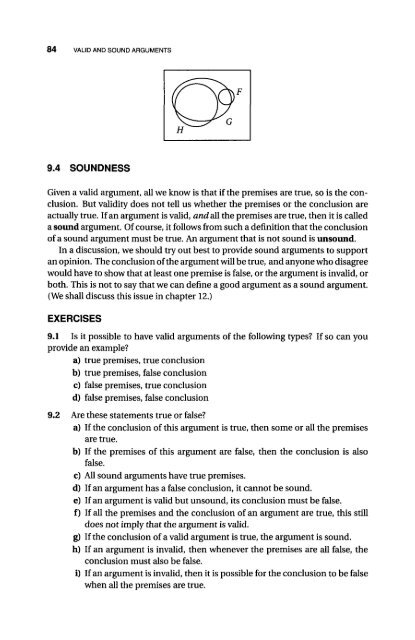An Introduction to Critical Thinking and Creativity - always yours
An Introduction to Critical Thinking and Creativity - always yours
An Introduction to Critical Thinking and Creativity - always yours
You also want an ePaper? Increase the reach of your titles
YUMPU automatically turns print PDFs into web optimized ePapers that Google loves.
84 VALID AND SOUND ARGUMENTS<br />
9.4 SOUNDNESS<br />
Given a valid argument, all we know is that if the premises are true, so is the conclusion.<br />
But validity does not tell us whether the premises or the conclusion are<br />
actually true. If an argument is valid, <strong>and</strong> all the premises are true, then it is called<br />
a sound argument. Of course, it follows from such a definition that the conclusion<br />
of a sound argument must be true. <strong>An</strong> argument that is not sound is unsound.<br />
In a discussion, we should try out best <strong>to</strong> provide sound arguments <strong>to</strong> support<br />
an opinion. The conclusion of the argument will be true, <strong>and</strong> anyone who disagree<br />
would have <strong>to</strong> show that at least one premise is false, or the argument is invalid, or<br />
both. This is not <strong>to</strong> say that we can define a good argument as a sound argument.<br />
(We shall discuss this issue in chapter 12.)<br />
EXERCISES<br />
9.1 Is it possible <strong>to</strong> have valid arguments of the following types? If so can you<br />
provide an example?<br />
a) true premises, true conclusion<br />
b) true premises, false conclusion<br />
c) false premises, true conclusion<br />
d) false premises, false conclusion<br />
9.2 Are these statements true or false?<br />
a) If the conclusion of this argument is true, then some or all the premises<br />
are true.<br />
b) If the premises of this argument are false, then the conclusion is also<br />
false.<br />
c) All sound arguments have true premises.<br />
d) If an argument has a false conclusion, it cannot be sound.<br />
e) If an argument is valid but unsound, its conclusion must be false.<br />
f ) If all the premises <strong>and</strong> the conclusion of an argument are true, this still<br />
does not imply that the argument is valid.<br />
g) If the conclusion of a valid argument is true, the argument is sound.<br />
h) If an argument is invalid, then whenever the premises are all false, the<br />
conclusion must also be false.<br />
i) If an argument is invalid, then it is possible for the conclusion <strong>to</strong> be false<br />
when all the premises are true.
















